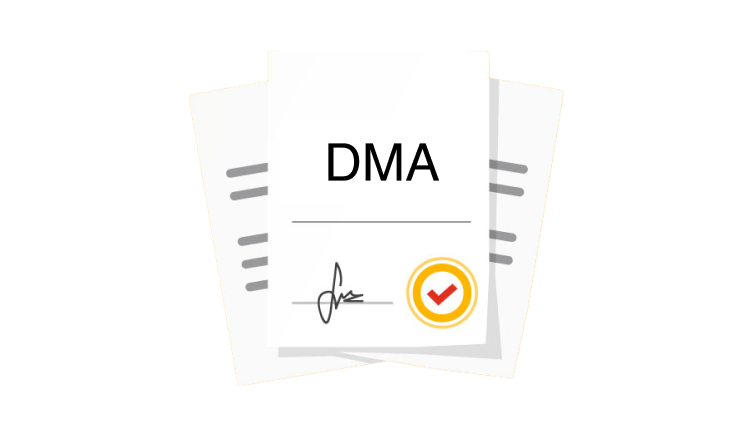
Legal Support for Businesses
DSA and DMA

What is DSA and DMA?
DSA (Digital Services Act) - is one of the most important EU regulations in recent years in the field of providing digital services. Colloquially called the "Constitution of the Internet", it strengthens the position of users of online platforms in relation to providers of these services. Depending on the nature of the services provided, undertakings must meet many new obligations. In practice, the DSA applies to most undertakings who share or store content on the Internet.
The DSA is fully applicable from February 17, 2024.
DMA (Digital Markets Act) - is a regulation aimed at restoring fairness in the digital sector fairer and making it more competitive. DMA establishes a set of clearly defined, objective criteria for identifying "gatekeepers". Gatekeepers are large undertakings offering the so-called core platform services, such as online search engines, online intermediation services, communication services. Gatekeepers must comply with the orders (i.e. obligations) and prohibitions (i.e. restrictions) listed in the DMA. The DMA is one of the first regulatory tools aimed at comprehensively regulating the activities of the largest digital undertakings.
The DMA is fully applicable from May 2, 2023.
Check how we can help your organization
Who is covered by the regulations?
Providers of intermediary services , i.e.:
mere conduit service providers, e.g. VoIP, internet service providers, top-level domain name registry
caching service providers, e.g. reverse proxy, content adaptation protocol
hosting service providers, e.g. cloud services, web-hosting, services enabling sharing information and content online, websites (in certain situations)
online platforms
online search engines
The current list of designated very large online platforms (VLOP) and very large online search engines (VLOSE) is available on the European Commission website.

Gatekeepers – large online platforms that have a strong market position and connect a large number of users to a large number of businesses.
An undertaking is presumed to meet the relevant requirements to be considered an access gatekeeper if:
it has achieved an annual turnover in the EU equal to or above EUR 7,5 billion in each of the last three financial years, or where its average market capitalisation or its equivalent fair market value amounted to at least EUR 75 billion in the last financial year, and it provides the same core platform service in at least three Member States
it it provides a core platform service that in the last financial year has at least 45 million monthly active end users established or located in the Union and at least 10 000 yearly active business users established in the Union
the above thresholds were met in each of the last three financial years.
The current list of gatekeepers is available on the European Commission website.

Fines for failure to comply with DSA and DMA
Undertakings who do not comply with DSA regulations must expect fines:
up to %
of the annual worldwide turnover for failure to fulfill any of the obligations specified in the DSA
Gatekeepers who violate the DMA must expect fines:
up to %
of its total worldwide turnover in the preceding financial year or up to 20 % in the case of repeated infringement of obligations
How can PwC help your organisation meet the requirements?

Digital Services Act (DSA)
- Review and update of terms and conditions
- Design, evaluate the assessment of interfaces (dark patterns), and create user-friendly content
- Verification of the internal system for handling complaints and taking action in case of abuse
- Support in fulfilling reporting obligations
- Provide legal support in verifying and reporting illegal digital content
- Provide support in handling complaints and justifying the implementation of measures against abuse
- Assess the advertising mechanisms and its adjustment (targeted advertising
- Represent in administrative proceedings before the President of the Office of Competition and Consumer Protection or the President of the Office of Electronic Communications and before the courts
- Provide risk management services and trainings

Digital Markets Act (DMA)
- Verify the undertaking’s status and support in fulfilling the obligations imposed by the DMA on gatekeepers
- Provide risk management services and trainings
- Represent in administrative proceedings before the European Commission and national courts
- Assist during negotiations with the gatekeeper
- Provide procedural support in pursuing legal claims against gatekeepers
- Submit a notification regarding the activities of the gatekeeper to the European Commission or the President of the Office of Competition and Consumer Protection
DSA i DMA
Need more information?
Check if your business falls under the scope of DSA provisions
Answer 4 short questions.
The questionnaire will take you less than 3 minutes to complete.
{{ currentQuestion.questionText[0] }}
{{ currentQuestion.questionCommentText }}
{{ result }}
Write to usThe survey has been prepared solely for general informational purposes and does not constitute professional advice. You should not base your actions or decisions on the results of this survey without first obtaining professional legal advice. We do not guarantee (expressly or impliedly) the correctness or accuracy of the information contained in the survey. Furthermore, to the extent permitted by Polish law, Pwc Legal Żelaźnicki sp.k., its partners, employees, or representatives do not undertake any obligations towards you or any other persons and do not assume any responsibility – whether contractual or otherwise – for any losses, damages, or expenses that may be a direct or indirect result of actions or decisions taken based on the information contained in the survey.
All rights reserved. In this document, the name "PwC" refers to PwC Legal Żelaźnicki sp.k.
Contact us


